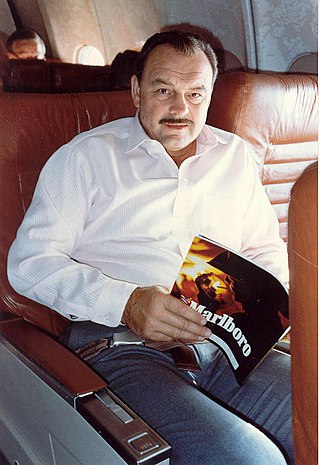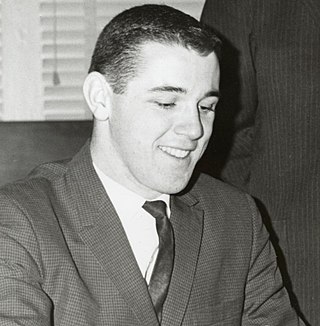Related Research Articles

Harold Edward "Red" Grange, nicknamed "the Galloping Ghost" and "the Wheaton Iceman", was an American football halfback who played for the Chicago Bears and the short-lived New York Yankees. His signing with the Bears helped legitimize the National Football League (NFL).

Richard Marvin Butkus was an American football linebacker, sports commentator, and actor. He played football for the Chicago Bears of the National Football League (NFL) from 1965 to 1973. He was invited to eight Pro Bowls in nine seasons, named a first-team All-Pro five times, and was twice recognized by his peers as the NFL's Defensive Player of the Year. Butkus was renowned as a fierce tackler and for the relentless effort with which he played. He is widely regarded as one of the greatest and most intimidating linebackers in professional football history.

Daniel Francis Fouts is an American former football quarterback who played for the San Diego Chargers of the National Football League (NFL) throughout his 15-season career (1973–1987). After a relatively undistinguished first five seasons in the league, Fouts came to prominence as an on-field leader during the Chargers' Air Coryell period. He led the league in passing yards every year from 1979 to 1982, throwing for over 4,000 yards in the first three of these—no quarterback had previously posted consecutive 4,000-yard seasons. Fouts was voted a Pro Bowler six times, first-team All-Pro twice, and in 1982 he was the Offensive Player of the Year. He was elected to the Pro Football Hall of Fame in 1993, his first year of eligibility.

Gale Eugene Sayers was an American professional football halfback and return specialist in the National Football League (NFL). In a relatively brief but highly productive NFL career, Sayers spent seven seasons with the Chicago Bears from 1965 to 1971, though multiple injuries effectively limited him to five seasons of play. He was known for his elusiveness and agility and was regarded by his peers as one of the most difficult players to tackle.

August Michael Michalske, sometimes known as "Iron Mike", was an American football player and coach. He was inducted into the Pro Football Hall of Fame as part of its second induction class in 1964. He was also named in 1969 to the NFL 1920s All-Decade Team.

John Joseph Concannon Jr. was an American football quarterback in the National Football League (NFL) for the Philadelphia Eagles, Chicago Bears, Dallas Cowboys, Green Bay Packers, and Detroit Lions. He played college football at Boston College.

Joseph Lee Stydahar nicknamed "Jumbo Joe", was an American football player and coach. He was inducted into the Pro Football Hall of Fame in 1967 and the College Football Hall of Fame in 1972.

Darrell E. Mudra Sr., nicknamed "Dr. Victory", was an American football coach. He served as the head football coach at Adams State College (1959–1962), North Dakota State University (1963–1965), the University of Arizona (1967–1968), Western Illinois University (1969–1973), Florida State University (1974–1975), Eastern Illinois University (1978–1982), and the University of Northern Iowa (1983–1987), compiling a career college football record of 200–81–4. Mudra was also the head coach of the Montreal Alouettes of the Canadian Football League (CFL) for one season in 1966. He was inducted into the College Football Hall of Fame as a coach in 2000.
David Ball is a former American football wide receiver. He was signed by the Chicago Bears as an undrafted free agent in 2007. He played college football for the New Hampshire Wildcats, and held the I-AA record for touchdown receptions until 2016.

Thomas Richard Blanchard is a former American football punter with an 11-year career in the National Football League (NFL) for the New York Giants, New Orleans Saints, and the Tampa Bay Buccaneers.
Herbert Felton Mul-Key is an American former professional football player who was a running back for three seasons with the Washington Redskins in the National Football League (NFL). He was a member of their Super Bowl VII squad, and appeared in the Pro Bowl in 1973. Born Herbert Mulkey, he hyphenated his name after having it made fun of in school.

Mac L. Percival is a former American football placekicker in the National Football League (NFL) for the Chicago Bears and Dallas Cowboys. He played college basketball at Texas Tech University.

The 1969 Michigan Wolverines football team was an American football team that represented the University of Michigan in the 1969 Big Ten Conference football season. In their first year under head coach Bo Schembechler, the Wolverines compiled an 8–3 record, played in the 1970 Rose Bowl, and finished the season ranked No. 9 in the final AP poll and No. 8 in the final UPI poll.

The 1971 Michigan Wolverines football team was an American football team that represented the University of Michigan in the 1971 Big Ten Conference football season. In their third season under head coach Bo Schembechler, the Wolverines compiled an 11–1 record, outscored opponents 421 to 83, won the Big Ten Conference championship, and were ranked No. 4 in the final UPI Poll and No. 6 in the final AP Poll. Defensive back Frank Gusich and center Guy Murdock were the team captains.

Joseph Anderson is a former American football wide receiver. He was signed by the Chicago Bears after going undrafted in the 2012 NFL draft. He played college football at Louisiana Tech and Texas Southern.
Clarence Washington is a former American football defensive tackle who played three seasons in the National Football League (NFL) for the Pittsburgh Steelers from 1969 to 1971. He played college football at the University of Arkansas at Pine Bluff, where he played alongside and roomed with future Steeler teammate L. C. Greenwood. According to sportswriter Jack Zanger, he and Greenwood both "demonstrated that they were worthy backup men" in 1969. Washington played in 13 games as a backup tackle in 1969 and then in all 14 games in 1970. Washington missed the 1971 season after suffering a broken leg during preseason workouts. He was traded to the Chicago Bears prior to the 1972 season for a draft pick due to the Steelers' surplus of quality defensive linemen, but the deal was voided because Washington failed the physical exam.
The 1895 Iowa Agricultural Cyclones football team represented Iowa Agricultural College as an independent during the 1895 college football season. The Cyclones compiled a 3–4 record and outscored all opponents by a combined total of 82 to 70. Ed Mellinger was the team captain.
The Instant Replay Game, also known as the Asterisk Game, was a National Football League (NFL) game between the Green Bay Packers and Chicago Bears on November 5, 1989. The Packers defeated the visiting Bears 14–13 on a controversial fourth-down touchdown pass from Don Majkowski to Sterling Sharpe with less than a minute to play in the game. Line judge Jim Quirk initially called a penalty on the play for an illegal forward pass, thus nullifying the potentially game-winning score. Quirk's penalty was based on the belief that Majkowski had thrown the pass after the ball had passed the line of scrimmage.
Cephus Weatherspoon is a former American football wide receiver who played professionally for the New Orleans Saints of the National Football League (NFL) and the Birmingham Vulcans of the World Football League (WFL).
References
- ↑ "Nagel announces 13 grid recruits". Iowa City Press-Citizen. May 13, 1970. p. 17. Retrieved September 2, 2022– via newspapers.com.
- ↑ "Hawkeyes add JC transfer". Quad-City Times. August 30, 1970. p. 2B. Retrieved September 2, 2022– via newspapers.com.
- ↑ Pierson, Don (February 3, 1972). "Chicagoans add 10 in pro grid draft". Chicago Tribune. p. 3-1. Retrieved September 1, 2022– via newspapers.com.
- 1 2 3 "Larry Horton". Pro Football Reference. Sports Reference. Retrieved September 1, 2022.
- ↑ "Larry Horton joins Clemons as Bear draftee". Iowa City Press-Citizen. February 3, 1972. p. 13. Retrieved September 2, 2022– via newspapers.com.
- ↑ "Bears sign 3 draftees; 12 in fold". Chicago Tribune. April 30, 1972. p. 3-3. Retrieved September 1, 2022– via newspapers.com.
- 1 2 3 4 Shnay, Jerry (August 24, 1972). "Bears' Horton tries to make it". Chicago Tribune. p. 3-2. Retrieved September 1, 2022– via newspapers.com.
- ↑ "Senate approves basketball merger". Herald and Review. September 8, 1972. p. 16. Retrieved September 1, 2022– via newspapers.com.
- ↑ Pierson, Don (October 11, 1972). "Gordon? He plans to sue". Chicago Tribune. p. 3-1. Retrieved September 1, 2022– via newspapers.com.
- ↑ Pierson, Don (October 18, 1972). "Bear linebackers key to defenses; may tip Vikings". Chicago Tribune. p. 4-3. Retrieved September 1, 2022– via newspapers.com.
- ↑ "Larry Horton Game Logs". Pro Football Reference. Sports Reference. Retrieved September 1, 2022.
- ↑ Rollow, Cooper (September 16, 1973). "Bears in full view for opener against Dallas". Chicago Tribune. p. 3-3. Retrieved September 1, 2022– via newspapers.com.
- ↑ Pierson, Don (October 11, 1973). "Limping doesn't bother Holman". Chicago Tribune. p. 3-1. Retrieved September 1, 2022– via newspapers.com.
- ↑ "Redskins sign DSC standout". Sioux City Journal. February 17, 1974. p. B12. Retrieved September 1, 2022– via newspapers.com.
- ↑ "NFL Transactions". Miami News. August 29, 1974. p. 2C. Retrieved September 1, 2022– via newspapers.com.
- ↑ Bacon, Dick (October 4, 1974). "Aloutte-Eskimo game on Tuesday crucial for both teams". The Gazette. p. 14. Retrieved September 1, 2022– via newspapers.com.
- ↑ Roberts, Fred (October 8, 1974). "Alouettes activate Horton". Montreal Star. p. B-1. Retrieved September 1, 2022– via newspapers.com.
- ↑ Roberts, Fred (October 19, 1974). "Levy has trouble planning for Riders". Montreal Star. p. G-1. Retrieved September 1, 2022– via newspapers.com.
- ↑ "Larry Horton". Stats Crew. Retrieved September 1, 2022.